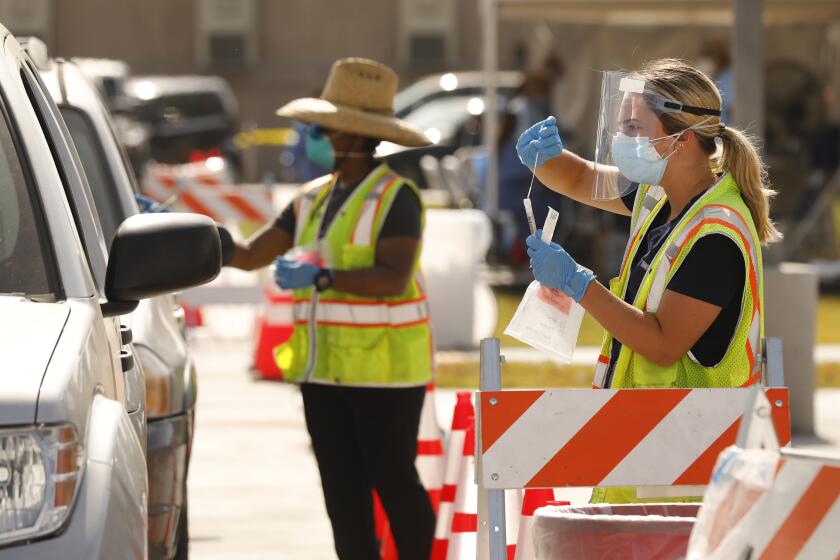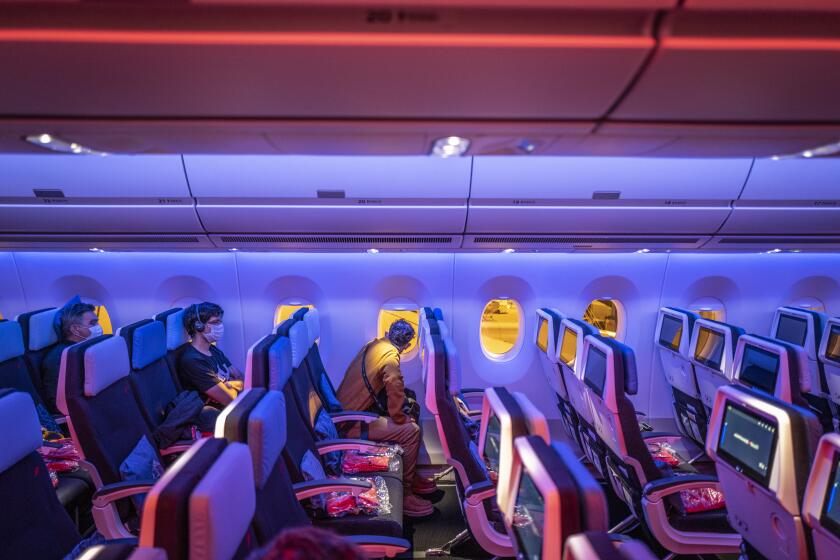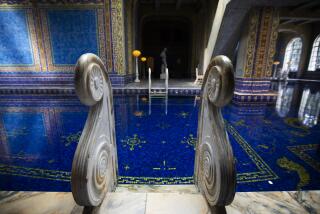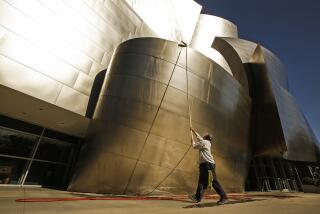As of July 23: What’s open and closed among Southern California beaches, parks, trails
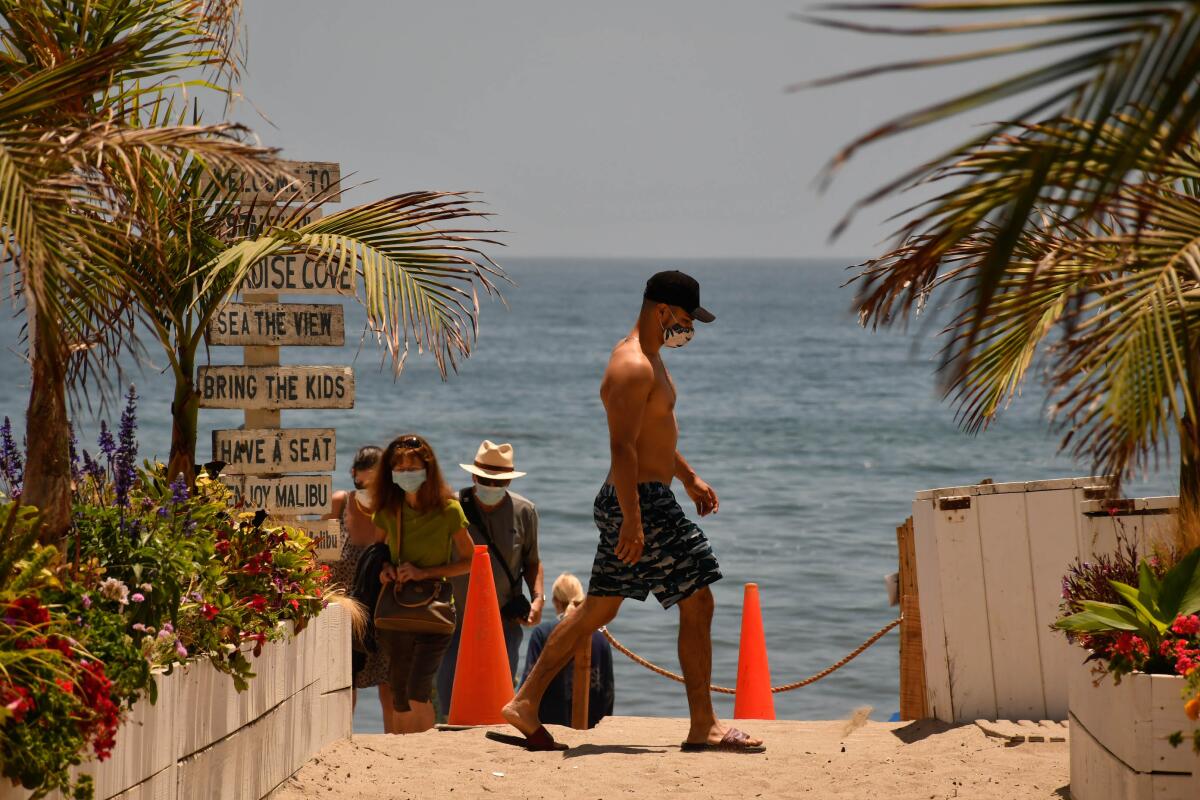
- Share via
As local and state authorities scramble to limit indoor risks amid rising pandemic infections, Southern Californians are increasingly looking to local parks, beaches and trails for exercise and relief.
Most of these public spaces are open, allowing hiking, walking, running, biking, swimming and surfing. But exceptions and restrictions apply, and local leaders have said they will be focusing more on enforcement.
•In Los Angeles neighborhoods from West L.A. to Eagle Rock, scores of streets have been barricaded to reduce auto traffic as part of the city’s growing “Slow Streets” program. The idea, city officials have written, is for local residents (not visitors from across town) “to gain access to more space for recreation activities in their neighborhoods, while protecting Angelenos from overcrowding on sidewalks and promoting social distancing.” Residents can apply for “slow street” status and see a map on a city Transportation Department website.
•In Angeles National Forest, the Henninger Flats Trail (via Pinecrest Gate) is open and accessible through the Eaton Canyon Nature Center. (Reservations are required to visit the adjacent Eaton Canyon Natural Area.) The forest’s popular Chantry Flat, previously closed on weekends, is now open but limited to 300 cars at a time on Saturdays and Sundays, a spokesman said. It remains open on weekdays.
•In heavily trafficked Griffith Park, where the L.A. Zoo, Griffith Observatory and many other structures remain closed, rangers have also closed Wisdom Tree Trail and Burbank Peak Trail.
•At L.A. County beaches, you can bring umbrellas and coolers and spend a day hanging out at the beach. Face coverings are required when you are not in the water and when you are around other people. Gatherings, volleyball and other group sports are still banned.
Since July 13, when Gov. Gavin Newsom announced a new round of restrictions, indoor dining is again banned at restaurants. Bars and breweries are restricted to outdoor sit-down service with food. Throughout California, zoos and museums are closed. So are bowling alleys, miniature golf, batting cages and arcades.)
The new order also forced more than two dozen counties, including Los Angeles, San Bernardino, Orange and Riverside, to shutter gyms, houses of worship, hair salons, malls and other businesses. The order remains in effect indefinitely in counties on the state’s list of highest infection rates.
Details on coronavirus cases county by county are available on the Los Angeles Times’ California coronavirus tracker. The L.A. Times is tracking openings, closures and restrictions at beaches statewide.
The Times is also tracking evolving rules county by county as California’s regions regulate restaurants, bars, retailers, hotels and other businesses while the state fights the coronavirus outbreak. (Los Angeles, Riverside, San Diego and Santa Barbara were among the California counties to close their bars in the last days of June after reopenings were followed by a jump in COVID-19 cases.)
Two months ago, California looked like a coronavirus success story. Now cases and hospitalizations are up and the state is rolling back its reopening.
Around Los Angeles County
In the Greater San Gabriel Valley, three popular garden sites are open, but by appointment only to non-members. The Huntington Library, Art Museum, and Botanical Gardens in San Marino, Descanso Gardens in La Cañada Flintridge and the L.A. County Arboretum in Arcadia all moved to the reservations-required policy to maintain distancing among visitors.
Get inspired to get away.
Explore California, the West and beyond with the weekly Escapes newsletter.
You may occasionally receive promotional content from the Los Angeles Times.
In other areas, Monrovia Canyon Park is open to visitors who get tickets in advance from 6:30 a.m. to 6 p.m. Mondays through Fridays. The park is closed Saturdays, Sundays and holidays, and access to the Waterfall Trail remains closed. “This trail is narrow and incredibly popular, making it incredibly difficult to ensure safe social distancing,” the website says.
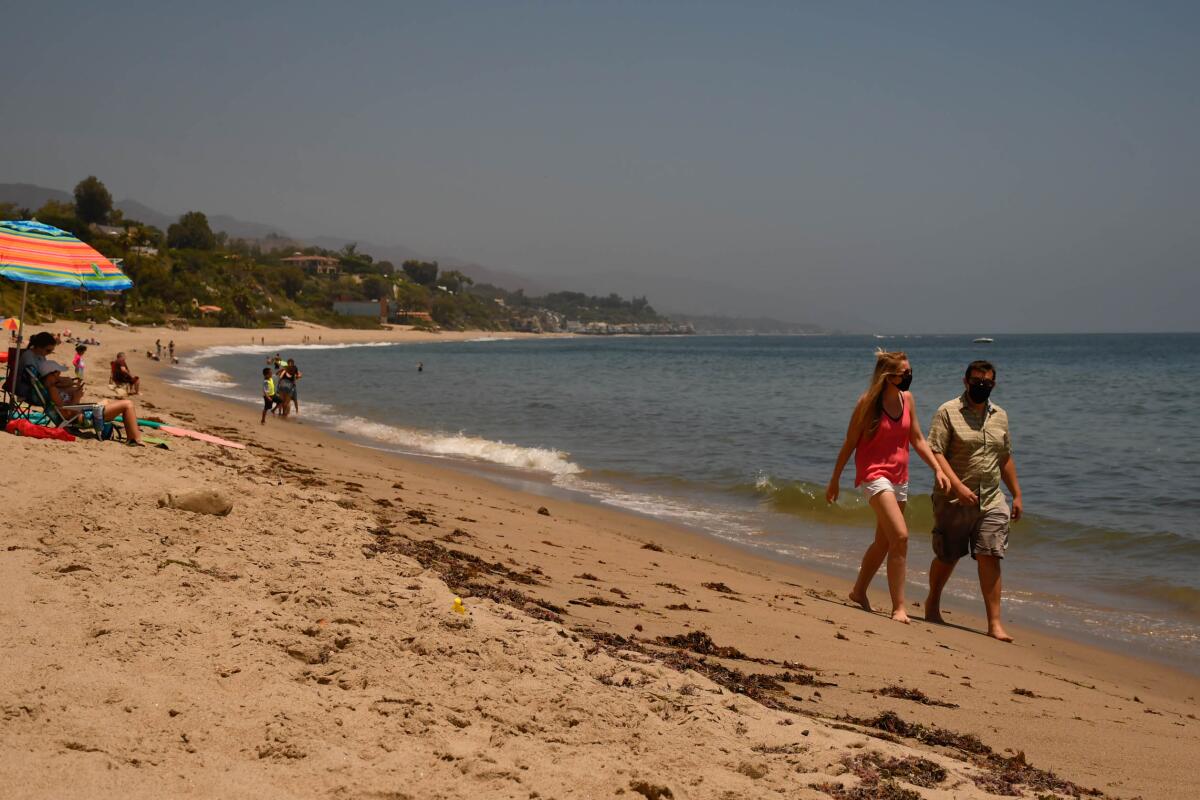
Catalina Island businesses are open and the Catalina Express will be running boats between Long Beach (or Dana Point) and Avalon, the island Chamber of Commerce said.
Most Los Angeles County trails will remain open, but Eaton Canyon Natural Area in Pasadena requires advance reservations because of overcrowding. County health officials urge hikers to stay home if they feel ill, to wear a mask and pass other hikers with care, to avoid gathering in groups, and to leave no trace. More details and advice are offered on the county trails website.
L.A. County on Friday opened 14 splash pads (play areas with water) that will be open through Sept. 30, Tuesdays through Saturdays, 10 a.m. to 6 p.m. The openings come with physical distancing requirements, group gatherings forbidden, “face covering required except in the water.”
The sites include: Allen Martin Park, Carolyn Rosas Park, City Terrace Park, Calton Park, Los Robles Park, Mayberry Park, Pathfinder Park, Pearblossom Park, Rimgrove Park, San Angelo Park, Stephen Sorenson Park, Sunshine Park, Valleydale Park and Washington Park.
In addition the county Friday opened three swim beaches at Castaic Lake, Frank B. Bonelli Regional Park in San Dimas and Santa Fe Dam Recreational Area in Baldwin Park. They are to be open through Sept. 9., Thursdays through Sundays, 10 a.m. to 5 p.m.
Pasadena’s Rose Bowl Aquatic Center is gradually resuming operations at reduced capacity, lockers closed and water fountains disabled.
Long Beach’s Belmont Pool reopened June 29 for lap swimming and water exercise, reservations required, showers closed.
Los Angeles city parks
Though city golf courses and tennis courts have reopened and parks are open, city recreation centers, aquatic facilities, skate parks, playgrounds, baseball fields, soccer fields and basketball courts remain closed.
At popular Runyon Canyon Park, the city website reported that the park was open with “limited trail access.”
All major U.S. carriers will require masks during the COVID-19 pandemic, Airlines for America, an industry trade group, announced Monday.
Piers at Venice and Cabrillo beaches are closed, even for fishing. Also, the Venice Boardwalk is open to people who grab a bite to eat or shop at a store, not to recreational walkers, cyclists or runners. Also, the Cabrillo Marine Aquarium in San Pedro remains closed, as is the Sherman Oaks Castle, and the Expo Center in Exposition Park.
Inland Empire
San Bernardino County has reopened its county parks, lakes, rivers and recreation areas.
Riverside County leaders have allowed golf courses to reopen, with restrictions. Hiking, bike- and horseback-riding on trails and in parks are also permitted under the county’s health order.
California state parks
State officials continue to urge Californians to stay close to home, but the parks system has been gradually reopening. Of roughly 280 parks statewide, 193 have at least partially opened their parking lots.
Now just 16 state park sites remain closed, including Los Encinos, Pio Pico and Watts Towers state historic parks in L.A. County.
Campgrounds are at least partially open at 85 state parks, but many are booked solid for many weeks ahead. Visitors are advised to visit the COVID-19 resource page to check which destinations and parking areas are open.
Get The Wild newsletter.
The essential weekly guide to enjoying the outdoors in Southern California. Insider tips on the best of our beaches, trails, parks, deserts, forests and mountains.
You may occasionally receive promotional content from the Los Angeles Times.
Santa Monica Mountains
The Santa Monica Mountains National Recreation Area, which straddles Los Angeles and Ventura counties, has reopened most of its trails, parking lots, overlooks and restrooms. Its two visitor centers remain closed, however. Like other agencies, the National Park Service urges hikers to wear face coverings and keep their distance from others.
Also, the Mountains Recreation and Conservation Authority has reopened most of its parks, trails, parking lots and restrooms. The authority manages more than 75,000 acres of open space, much of it owned by the Santa Monica Mountains Conservancy.
National forests in Southern California
Most trails and natural areas are open in Southern California’s national forests. Some areas are closed because of overcrowding during the pandemic.
In the Angeles National Forest north of L.A., besides adjustments at Chantry Flat, Roberts Camp above Sierra Madre remains closed on weekends. Picnic areas are open. So are the popular first-come, first-served campgrounds at Sycamore, South Fork and Big Rock. Many other campgrounds and visitor centers are still closed.
In the San Bernardino National Forest, trails, trailheads, picnic areas and campgrounds are open. However, popular swimming holes, including Aztec Falls at Deep Creek, are temporarily closed in the Lake Arrowhead area. The closure also includes Hook Creek Road.
In the Los Padres National Forest, trails and campgrounds are open, except the Santa Paula Canyon and the Last Chance Trail in the Ojai District is closed. For information on different areas, go to the forest’s website for updates about the Monterey, Santa Lucia, Santa Barbara, Ojai and Mt. Pinos areas.
In the Cleveland National Forest, trails are open, but check the website for the status of campgrounds.
National parks in California
All of California’s 11 national parks and recreation areas are now open. The most recent reopenings include several campgrounds in Death Valley, and Muir Woods in the Golden Gate National Recreation Area.
Recent closures include two campgrounds in Joshua Tree National Park — not because of COVID-19 but because of aggressive bees seeking water in the summer heat. See a park-by-park list of closures.
More to Read
Sign up for The Wild
We’ll help you find the best places to hike, bike and run, as well as the perfect silent spots for meditation and yoga.
You may occasionally receive promotional content from the Los Angeles Times.
